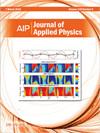通过规定精度来解决准确性问题:点缺陷能量学的贝叶斯误差估计
IF 2.5
3区 物理与天体物理
Q2 PHYSICS, APPLIED
引用次数: 0
摘要
利用密度泛函理论(DFT)可以计算带电点缺陷的形成能,进而预测一系列与实验相关的量,如缺陷浓度、电荷转移水平或重组率。虽然之前的努力已经显著提高了此类计算的准确性,但在量化其不确定性方面所做的努力相对较少。然而,在更广阔的 DFT 研究领域,贝叶斯误差估计函数(BEEF)的发展使其他性质的不确定性量化(UQ)成为可能。在本文中,我们研究了贝叶斯误差估计函数作为缺陷形成能量不确定性量化工具的实用性。我们建立了一个通过形成能计算传播 BEEF 能量的管道,并在跨越各种化学性质、带隙和晶体结构的多个材料系统中对其内在缺陷进行了测试,同时与之前公布的结果(如有)进行了比较。我们还评估了对准深层跃迁而非价带最大值(VBM)的影响。我们观察到估计的不确定性与超级电池尺寸的关系可以忽略不计,不过这种关系可能会因为无法单独计算 BEEF 集合中每个成员的有限尺寸修正而变得模糊不清。此外,我们发现在没有深层配准的情况下,估计不确定性会随着缺陷的绝对电荷和缺陷点周围的弛豫而增加,但在应用配准时则没有这种趋势。虽然还需要进一步研究,但我们的结果表明 BEEF 可以成为缺陷计算中 UQ 的有用方法。本文章由计算机程序翻译,如有差异,请以英文原文为准。
Addressing accuracy by prescribing precision: Bayesian error estimation of point defect energetics
With density functional theory (DFT), it is possible to calculate the formation energy of charged point defects and in turn to predict a range of experimentally relevant quantities, such as defect concentrations, charge transition levels, or recombination rates. While prior efforts have led to marked improvements in the accuracy of such calculations, comparatively modest effort has been directed at quantifying their uncertainties. However, in the broader DFT research space, the development of Bayesian Error Estimation Functionals (BEEF) has enabled uncertainty quantification (UQ) for other properties. In this paper, we investigate the utility of BEEF as a tool for UQ of defect formation energies. We build a pipeline for propagating BEEF energies through a formation-energy calculation and test it on intrinsic defects in several materials systems spanning a variety of chemistries, bandgaps, and crystal structures, comparing to prior published results where available. We also assess the impact of aligning to a deep-level transition rather than to the VBM (valence band maximum). We observe negligible dependence of the estimated uncertainty upon a supercell size, though the relationship may be obfuscated by the fact that finite-size corrections cannot be computed separately for each member of the BEEF ensemble. Additionally, we find an increase in estimated uncertainty with respect to the absolute charge of a defect and the relaxation around the defect site without deep-level alignment, but this trend is absent when the alignment is applied. While further investigation is warranted, our results suggest that BEEF could be a useful method for UQ in defect calculations.
求助全文
通过发布文献求助,成功后即可免费获取论文全文。
去求助
来源期刊

Journal of Applied Physics
物理-物理:应用
CiteScore
5.40
自引率
9.40%
发文量
1534
审稿时长
2.3 months
期刊介绍:
The Journal of Applied Physics (JAP) is an influential international journal publishing significant new experimental and theoretical results of applied physics research.
Topics covered in JAP are diverse and reflect the most current applied physics research, including:
Dielectrics, ferroelectrics, and multiferroics-
Electrical discharges, plasmas, and plasma-surface interactions-
Emerging, interdisciplinary, and other fields of applied physics-
Magnetism, spintronics, and superconductivity-
Organic-Inorganic systems, including organic electronics-
Photonics, plasmonics, photovoltaics, lasers, optical materials, and phenomena-
Physics of devices and sensors-
Physics of materials, including electrical, thermal, mechanical and other properties-
Physics of matter under extreme conditions-
Physics of nanoscale and low-dimensional systems, including atomic and quantum phenomena-
Physics of semiconductors-
Soft matter, fluids, and biophysics-
Thin films, interfaces, and surfaces
 求助内容:
求助内容: 应助结果提醒方式:
应助结果提醒方式:


